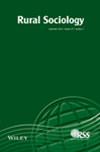Rural Life, Rural Healthcare, and Telehealth: An Interpretive Phenomenology Study
IF 1.9
3区 社会学
Q2 SOCIOLOGY
引用次数: 0
Abstract
Telehealth may help ameliorate rural healthcare shortages and related negative health outcomes for rural populations in the United States. However, telehealth utilization has been lower among rural than urban populations. Patient experiences are an essential determinant of healthcare utilization and effectiveness. To inform efforts to address disparities in telehealth utilization, we sought a situated, contextual understanding of patient experiences with telehealth among rural‐dwelling adults in California. We used Interpretive Phenomenology qualitative methods. In‐depth semi‐structured interviews explored rural life contexts, rural healthcare experiences, and valuations of telehealth among 16 rural‐dwelling adults who used telehealth at a distant urban medical center. Themes of scarcity and fragmented care characterized participants' rural healthcare experiences. Participants placed high value on their rural settings, despite limitations imposed by rural living. Informed by these contexts, participants offered highly positive assessments of telehealth and its utility for rural patients. Telehealth emerged as a positive tool for participants to support healthcare access and a rural way of life. However, findings point to a need to explore whether telehealth may contribute to rural healthcare bypass behaviors. Ongoing research is also needed to understand the telehealth experiences and preferences of underserved and minoritized rural populations.农村生活、农村医疗保健与远程医疗:一项解释现象学研究
远程保健可能有助于改善美国农村人口的医疗保健短缺和相关的负面健康结果。然而,农村人口的远程保健使用率低于城市人口。患者经验是医疗保健利用和有效性的重要决定因素。为了解决远程医疗利用方面的差异,我们寻求对加利福尼亚州农村成年人远程医疗患者体验的情境理解。我们使用解释现象学定性方法。深入的半结构化访谈探讨了16名居住在偏远城市医疗中心使用远程医疗的农村成年人的农村生活背景、农村医疗保健经验和远程医疗的评估。稀缺性和支离破碎的护理主题是参与者农村医疗保健经历的特征。尽管受到农村生活的限制,但参与者非常重视他们的农村环境。在了解了这些情况后,与会者对远程保健及其对农村病人的效用给予了高度肯定的评价。远程保健已成为参与者支持获得保健和农村生活方式的一种积极工具。然而,研究结果指出,需要探索远程医疗是否可能有助于农村医疗旁路行为。还需要进行持续的研究,以了解服务不足和少数群体农村人口的远程保健经验和偏好。
本文章由计算机程序翻译,如有差异,请以英文原文为准。
求助全文
约1分钟内获得全文
求助全文
来源期刊

RURAL SOCIOLOGY
SOCIOLOGY-
CiteScore
4.60
自引率
13.00%
发文量
47
期刊介绍:
A forum for cutting-edge research, Rural Sociology explores sociological and interdisciplinary approaches to emerging social issues and new approaches to recurring social issues affecting rural people and places. The journal is particularly interested in advancing sociological theory and welcomes the use of a wide range of social science methodologies. Manuscripts that use a sociological perspective to address the effects of local and global systems on rural people and places, rural community revitalization, rural demographic changes, rural poverty, natural resource allocations, the environment, food and agricultural systems, and related topics from all regions of the world are welcome. Rural Sociology also accepts papers that significantly advance the measurement of key sociological concepts or provide well-documented critical analysis of one or more theories as these measures and analyses are related to rural sociology.
 求助内容:
求助内容: 应助结果提醒方式:
应助结果提醒方式:


